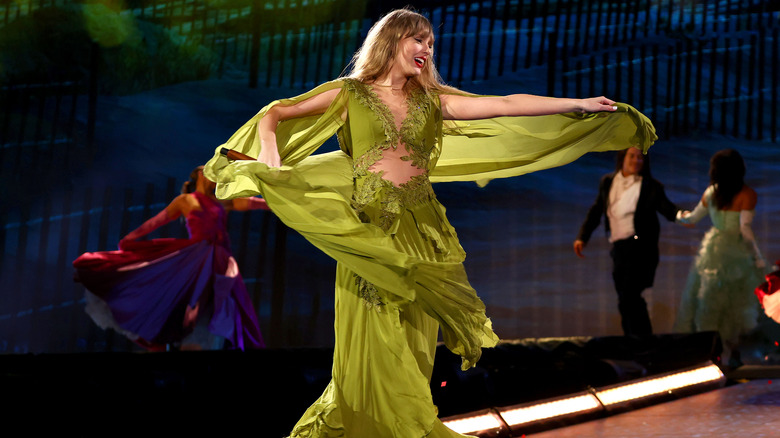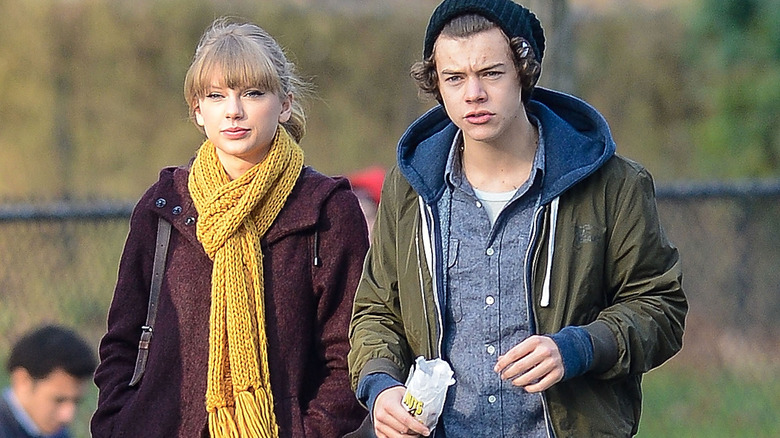What's The Real Meaning Behind Taylor Swift's But Daddy, I Love Him? Let's Break It Down
Those people stumbling in late to the office or classroom on April 19 can be excused for being a bit sleepy: Taylor Swift, the stunning transformative music superstar, dropped her newest album at midnight. "The Tortured Poets Department" has 16 new tracks, plus featured appearances by Post Malone and Florence + The Machine, making it another must-listen for Swifties worldwide. Swift herself described it (via X, aka Twitter) as "An anthology of new works that reflect events, opinions and sentiments from a fleeting and fatalistic moment in time – one that was both sensational and sorrowful in equal measure."
Among the soon-to-be hits on the collection is "But Daddy, I Love Him." In the vein of Madonna's "Papa Don't Preach" and Magic's "Rude," the song is told from the point of view of a young woman who defies her family by falling for the wrong guy. In this case, the narrator is a "dutiful daughter" from a conservative religious background; the pearl-clutching "Sarahs and Hannahs in their Sunday best...try to save you 'cause they hate you." Defying both her father and the church elders, she escapes town with her "wild boy, " but not before giving the disapproving folks one more shock. "I'm having his baby," she announces, then follows with a gotcha: "No I'm not, but you should see your faces."
So is this just a fictional tale of star-crossed lovers, or is there more to the song than meets the, um, ear? Let's take a deeper dive.
Did Taylor Swift name her song after a favorite movie?
Even before the album dropped, Taylor Swift's fans were quick to spot a possible meaning behind the title of "But Daddy, I Love Him." As Just Jared pointed out, that phrase happens to be a line from the classic Disney film "The Little Mermaid," which came out the same year Swift was born. The sea ruler King Triton discovers to his horror his youngest daughter has fallen for the human Prince Eric. Ariel responds with the plea; Triton goes a fury, which in turn prompts Ariel to make her bargain with the scheming Ursula.
Like Ariel, Swift's narrator yearns to be free of her restrictive surroundings and be with the guy she loves, even if no one thinks they should be together. Similarly, true love wins out in both cases. "Little Mermaid" ends with Triton's giving his blessing to Ariel and Eric; he even turns her back into a human so they can be wed. The Swift song finds the narrator and her SO eventually returning home and finding acceptance: "[W]ent to my parents and they came around," she gloats. The couple marries — with no invites sent to the "most judgmental creeps who say they want what's best for me."
True, Swift has yet to say her I-dos to anyone as yet (though eyes are peeled to see what happens with Travis Kelce). But the song makes it perfectly clear she's not looking for anyone's approval when it comes to relationships.
Fans think they know who the song is about
Taylor Swift has a rep for immortalizing her past relationships in her songs, and her fans are sure "But Daddy, I Love Him" is no different. But opinions are split as to the identity of the "wild boy" who's "crazy, but he's the one I want." Some interpreters say the work is about Swift's ex Joe Alwyn, who they feel may have stifled the singer by insisting the relationship be totally under the radar. Others are musing about another of Swift's past boyfriends, Harry Styles, who was actually photographed back in 2020 wearing a T-shirt bearing the famous phrase.
Yet another theory, according to Us Weekly, claims most of "Tortured Poets Department" is about Swift's short-lived alleged dalliance with singer Matty Healy of 1975. It was criticized at the time because of several insensitive comments Healy made, including an interview in which he spoke of being resentful of the idea of being just "Taylor Swift's boyfriend." He has denied there was anything going on, instead saying they "hung out" but didn't actually date. So if the song is actually about Healy, was Swift imagining a different outcome? Or is the story more of a defiant middle finger to everyone who has ever criticized any of her past or present boyfriends?
"But Daddy, I Love Him" won't go down as one of Taylor Swift's most tragic lyrics ever — it's a song of triumph, not regret. But that won't stop it from becoming a favorite listen of Swifties everywhere.

